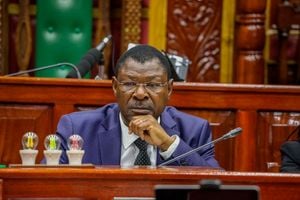
The National Assembly during a sitting.
That quorum hitches in the National Assembly—which made it difficult for the House to transact business—were such a common occurrence in 2024 is not a secret.
Such hitches, usually at the beginning of every sitting, were so typical of the entire third session of the 13th Parliament that the National Assembly could not transact business without a quorum bell being rang to whip the members into the debating chamber.
In some instances, the House had to adjourn prematurely because of the quorum issues.
One such incident was on October 9, 2024 when the House failed to raise the required numbers to transact business, effectively stalling the processing of 14 motions and four members’ private Bills.
Never mind that the quorum hitch came just hours after the House had raised 326 of the 349 members to impeach then Deputy President Rigathi Gachagua.
Article 121 of the constitution determines the quorum of parliament at 50 members in the case of the National Assembly and 15 members for the Senate. Either House cannot start business or take a vote on critical matters like the budget or Bills without attaining the requisite quorum.
On November 21, 2023, Speaker Moses Wetang’ula openly expressed his frustrations after he was kept waiting in the chair for members to stream into the debating chamber so that the House could start its business. Having had enough of the hitches, he turned the heat on the Leader of Majority.
“It is very unkind to allow the Speaker to come and sit here helplessly as we continue ringing the quorum bell when we have enough members to whip themselves to be in the House, even without being whipped,” an obviously frustrated Mr Wetang’ula said.
“Leader of the Majority Party, what happened to our covenant on quorum? I do not see any of the Chief Whips from either side!” an infuriated Speaker Wetang’ula said as he demanded accountability.
“You assured the House as an Office that at the beginning of every sitting, all chairpersons of committees must be in the House because their numbers alone constitute a quorum. We have more than enough members when you add the vice-chairpersons. What happened?”
The National Assembly has 20 departmental committees each with a chairperson and vice-chairperson. It also has 24 audit, appropriations and other select committees, each with a chairperson and vice-chairperson, save for the House Business Committee, Committee on Appointments and the Committee on Powers and Privileges chaired by the Speaker. There is also the Committee on Selection chaired by Leader of Majority.
This means that the committee chairpersons and their deputies alone are enough to constitute a quorum in the House.
However, Leader of Majority Kimani Ichung’wah (Kikuyu) was not in the chamber at the time, leaving his deputy Owen Baya (Kilifi North) to deal with the Speaker’s frustrations.
“Speaker, it is very unfortunate that this is happening. As you said, we have the numbers, especially chairpersons and vice-chairpersons of committees. I want to be very categorical that they lack a sense of responsibility,” said Mr Baya.
But the Speaker was not pleased with Mr Baya’s response.
“It is not that you do not have choices because you do,” the Speaker reminded Mr Baya, who in turn promised that things would change.
“Yes, we have choices. I assure you that as we approach the next session of Parliament, we will crack the whip on our chairpersons and vice-chairpersons. We will ensure that we do not have this problem after we come back from recess. It also embarrasses us as leadership,” Mr Baya said.
Article 103 (1) (b) of the Constitution states that if during any session of Parliament a member is absent for eight sittings without permission in writing from the Speaker and is unable to offer a satisfactory explanation for the absence, the member loses his or her seat.
An MP who did not want to go on record said that it was more important “for me to come and register my presence then leave for other duties”. “If I stay here the entire sitting minus a sitting allowance it means I will have wasted my day,” the member said.
There are allegations that in some instances, MPs have had to be induced through cash handouts to attend plenary and committee sittings.
Quorum hitches also happen when the House is already transacting its business. In such case, the Speaker or whoever is in the chair will order for the quorum bell to be rang and if there is still no quorum, the House will adjourn.
Previously, in such instances, members would forfeit the plenary sitting allowance for the aborted sitting. But rarely would a House sitting adjourn for lack of quorum because MPs would mobilise their colleagues to ensure that they do not miss the allowance.
The House failed to pass critical matters for lack of quorum. The Bills that had been lined up for consideration by the House on October 9, 2024 when the House adjourned prematurely for lack of quorum include the Kenya Information Communications (Amendment) Bill 2022 by Gem MP Elisha Odhiambo.
There was also the Community Health Workers Bill 2022 by Martin Owino (Ndhiwa), the Higher Education Loans Board (Amendment) Bill 2022 by Machakos County Woman Rep Joy Kamene and the Parliamentary Powers And Privileges (Amendment) Bill 2023 by Bumula MP Jack Wamboka.
The 14 motions that had been lined up for debate included one by Alego Usonga MP Samuel Atandi to support and promote local fertiliser manufacturers. There was also one on the national sensitisation and support for combating sickle cell and haemophilia disease by Matungu MP Peter Nabulindo.
The motion sought to have the national and county governments conduct awareness and sensitisation programmes on the two diseases. It also wanted the government to support research and training for medical personnel on the diseases and put measures in place for the mandatory screening of newborn babies in all public health facilities.









